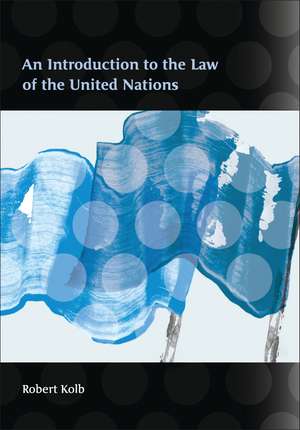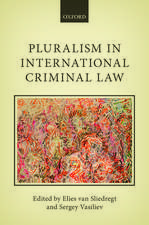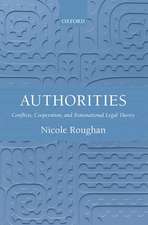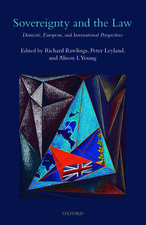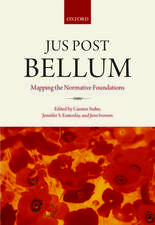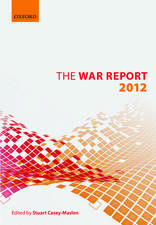An Introduction to the Law of the United Nations
Autor Robert Kolben Limba Engleză Paperback – 25 feb 2010
Preț: 273.42 lei
Preț vechi: 349.57 lei
-22% Nou
Puncte Express: 410
Preț estimativ în valută:
52.34€ • 56.87$ • 43.99£
52.34€ • 56.87$ • 43.99£
Carte disponibilă
Livrare economică 01-15 aprilie
Preluare comenzi: 021 569.72.76
Specificații
ISBN-13: 9781841139371
ISBN-10: 1841139378
Pagini: 274
Dimensiuni: 156 x 234 x 14 mm
Greutate: 0.5 kg
Editura: Bloomsbury Publishing
Colecția Hart Publishing
Locul publicării:London, United Kingdom
ISBN-10: 1841139378
Pagini: 274
Dimensiuni: 156 x 234 x 14 mm
Greutate: 0.5 kg
Editura: Bloomsbury Publishing
Colecția Hart Publishing
Locul publicării:London, United Kingdom
Notă biografică
Robert Kolb is Professor of Public International Law at the University of Geneva. He has worked as legal adviser at the International Committee of the Red Cross from 1998 to 1999, and occasionally for the International Law Directorate of the Swiss Federal Department of Foreign Affairs and the Federal Military Department (Law of Armed Conflicts). He is also Counsel for Lalive Attorneys-at-Law, Geneva.
Cuprins
1 Sketch of the Evolution of the Idea for a World Organisation 2 From the League of Nations to the United Nations 3 The Establishment of the United Nations Organisation 4 Phases in the History of the United Nations 5 General Layout of the Charter 6 Ideological Manifesto of the Charter: Peace, Cooperation, Rights of theHuman Person 7 Fundamental Principles of the Charter 8 Membership of the United Nations (Chapter II, Articles 3-6)9 Organs of the United Nations: Functions and Powers 10 United Nations 'Family': Specialised Affiliated Organisations 11 Article 103 of the Charter 12 Amendment and Revision of the Charter 13 Effectiveness of the United Nations
Recenzii
Kolb has an obvious and assured mastery of the Charter and its history and, what is equally important in an introductory work of this type, a good sense of when to summarise routine or obsolete subjects and when to 'dig in' and explore the most interesting topics in greater detail. There is much of value here and ... I would ... recommend it for use by undergraduate public international law students and graduate students who require a general introduction to the Charter.
The Preface's objective - to provide a readable and concise introduction to the legal aspects of the functioning of the UN- has been skillfully achieved.The need for a succinct but authoritative reader has now been fulfilled.
A comprehensive resource for practising lawyers as well as students, this volume covers both the twentieth century history of the United Nations and its current roles.
The Preface's objective - to provide a readable and concise introduction to the legal aspects of the functioning of the UN- has been skillfully achieved.The need for a succinct but authoritative reader has now been fulfilled.
A comprehensive resource for practising lawyers as well as students, this volume covers both the twentieth century history of the United Nations and its current roles.
Descriere
This work fills a gap in the existing literature by presenting a compact, concise but nevertheless panoramic view of the law of the United Nations.
